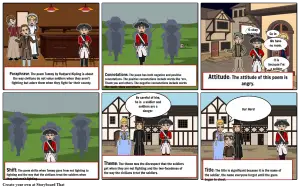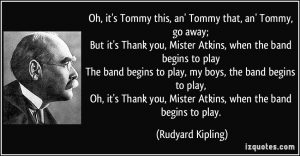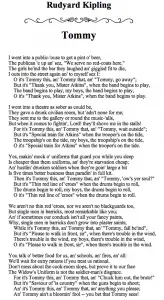Tommy by Rudyard Kipling: If you have come across this poem, chances are, you felt exactly what I did. “Tommy” is such a powerful poem with its context percolating through decades at a stretch.

At one point, you feel that little knot tighten up in your throat and your mind knows how true the words are.
Tommy by Rudyard Kipling – What is it about?
Tommy by Rudyard Kipling is about the redcoats and the treatment they received in peaceful times and the exact opposite when wars raged. “Tommy” here is not one person, it symbolizes the soldier community which was popularly referred to as ‘Tommy Atkins’. Atkins meant ‘the son of the red earth’.
“I went into a public-‘ouse to get a pint o’ beer,
The publican ‘e up an’ sez, “We serve no red-coats here.”
The girls be’ind the bar they laughed an’ giggled fit to die,
I outs into the street again an’ to myself sez I:
O it’s Tommy this, an’ Tommy that, an’ “Tommy, go away”;
But it’s “Thank you, Mister Atkins” when the band begins to play,
The band begins to play, my boys, the band begins to play,
O it’s “Thank you, Mister Atkins” when the band begins to play.”
Tommy by Rudyard Kipling enters a bar where he is refused the pint of beer he orders because he is a “red coat”- a soldier. The girls behind the counter laugh and giggle, mocking him. Surprisingly, when the drums roll and the parade begins, the same people echo, “Thank you Mister Atkins” while otherwise, it is “Tommy go away”!

“I went into a theatre as sober as could be,
They gave a drunk civilian room, but ‘adn’t none for me;
They sent me to the gallery or round the music-‘alls,
But when it comes to fightin’, Lord! they’ll shove me in the stalls!
For it’s Tommy this, an’ Tommy that, an’ “Tommy, wait outside”;
But it’s “Special train for Atkins” when the trooper’s on the tide,
The troopship’s on the tide, my boys, the troopship’s on the tide,
O it’s “Special train for Atkins” when the trooper’s on the tide.”
The people found it easier to accept a drunkard than a soldier fighting for them. They had room for a drunk civilian in the theatre but had no seat for Tommy. He was promptly sent to the gallery or to the music halls.
However, when it comes to going on wars, they will shove them into the stalls to fight for their safety and their countries. He will be given a special train and will be encouraged to lay down his life for these people.
“Yes, makin’ mock o’ uniforms that guard you while you sleep
Is cheaper than them uniforms, an’ they’re starvation cheap;
An’ hustlin’ drunken soldiers when they’re goin’ large a bit
Is five times better business than paradin’ in full kit.
Then it’s Tommy this, an’ Tommy that, an’ “Tommy, ‘ow’s yer soul?”
But it’s “Thin red line of ‘eroes” when the drums begin to roll,
The drums begin to roll, my boys, the drums begin to roll,
O it’s “Thin red line of ‘eroes” when the drums begin to roll.”
It is always easier and “cheaper” to mock the uniforms that protect. But when they are preparing to march into the battlefield, they are heroes, “Thin red line of heroes”!
“We aren’t no thin red ‘eroes, nor we aren’t no blackguards too,
But single men in barricks, most remarkable like you;
An’ if sometimes our conduck isn’t all your fancy paints,
Why, single men in barricks don’t grow into plaster saints;
While it’s Tommy this, an’ Tommy that, an’ “Tommy, fall be’ind”,
But it’s “Please to walk in front, sir” when there’s trouble in the wind,
There’s trouble in the wind, my boys, there’s trouble in the wind,
O it’s “Please to walk in front, sir” when there’s trouble in the wind.”
They are no heroes just because they live in barracks but are normal people like the civilians of the country. Sometimes, soldiers do create a raucous but they, most of them, grew up in barracks and such men don’t go on to become saints. In other situations, they are expected to fall behind but when there is trouble, these soldier boys will be made to walk in front.

“You talk o’ better food for us, an’ schools, an’ fires, an’ all:
We’ll wait for extry rations if you treat us rational.
Don’t mess about the cook-room slops, but prove it to our face
The Widow’s Uniform is not the soldier-man’s disgrace.
For it’s Tommy this, an’ Tommy that, an’ “Chuck him out, the brute!”
But it’s “Saviour of ‘is country” when the guns begin to shoot;
An’ it’s Tommy this, an’ Tommy that, an’ anything you please;
An’ Tommy ain’t a bloomin’ fool — you bet that Tommy sees!”
The people, the government, they promise a better lifestyle for the soldiers but in reality, they didn’t even receive extra rations. But Tommy by Rudyard Kipling is not a fool. He understands the situation. He understands the double standard of the people.
This poem was written in the era when it was most required and had a fresh approach. Kipling upheld the woes of the most important people in a country.
More Info On- Rudyard-Kipling Biography, Ditties Rudyard-Kipling, Poem by Rudyard, works of